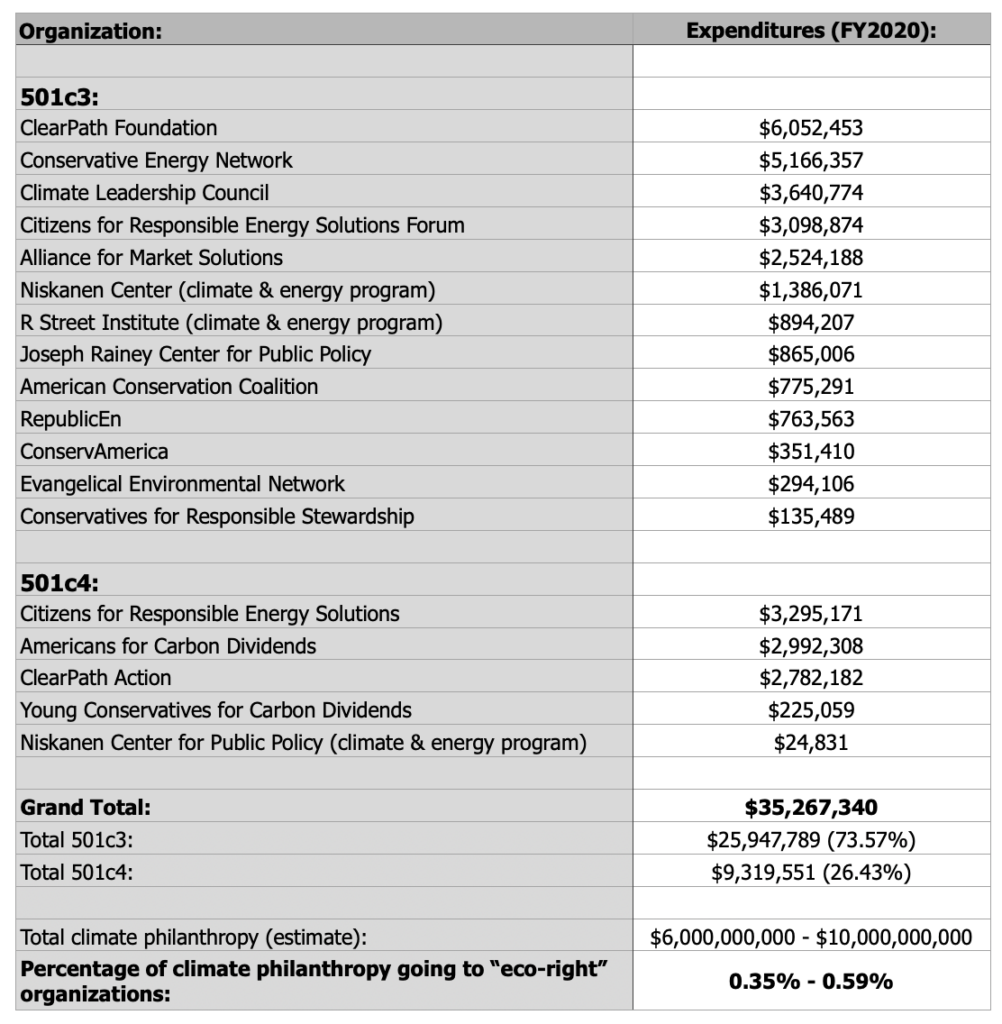Recent commentary by former Republican officials has drawn attention to the question of philanthropic funding for engaging right-of-center constituencies on climate change. Writing in the Chronicle of Philanthropy and Politico, former representatives Carlos Curbelo (R-FL), Ryan Costello (R-PA), and Francis Rooney (R-FL), and former Federal Energy Regulatory Committee (FERC) Chairman Neil Chatterjee all cite a 2018 study indicating that less than two percent of philanthropic dollars for climate communications and mobilization goes to engaging conservative communities.
The Bridgespan Group, in their new report, “Winning on Climate Change: How Philanthropy Can Spur Major Progress Over the Next Decade,“ also spotlight this resource imbalance.
The consequences of this funding disparity are material. As former Congressmen Rooney (who co-chaired the bipartisan House Climate Solutions Caucus) and Costello summarize:
“In its work on climate change, the Democratic Party is guided by a formidable civil society apparatus – including think tanks, grassroots organizations and more – that pushes, pulls and applauds Democrats as they act on this issue. There is little equivalent on the right. The small assemblage of organizations that make up the ‘eco-right,’ while growing, receive only a fraction of the funding that left-of-center groups do.“
In this analysis, we dig deeper into their claim. Our assessment of the budgets of eco-right organizations suggests that the true figure is significantly less than two percent, and potentially as low as 0.35 percent. (See below for more on this analysis.) Climate philanthropists spent between $6-10 billion on climate change mitigation in 2020. Of this, less than $36 million appears to have gone to eco-right organizations – between 0.35 percent and 0.59 percent.
This finding warrants serious attention from climate funders. Despite the imperative for greater U.S. leadership on climate change — and the rarity of one-party control of government – philanthropists appear to be significantly under-investing in the kind of organizing that can help support bipartisan action on the issue. The U.S. only has two major political parties. And yet, of the billions now flowing to climate-related, education, organizing, and advocacy (itself a small sliver of overall philanthropy), only a rounding error is dedicated to engaging right-of-center constituencies on one of the greatest challenges of our time.
Practically, this funding allocation not only misses an opportunity to build a broader, bipartisan mandate for climate solutions. It also leaves a void that entrenched interests have exploited to promote climate disinformation and delay action. Despite increasingly visible climate impacts, and growing public concern about the issue, sustained bipartisan support for climate policymaking remains elusive. This must change if we are to deliver on the imperative to reduce emissions at speed and scale.
As Thais Lopez Vogel, co-founder and trustee of the VoLo Foundation, and trustee of EDF Action, summarizes: “Climate change is an undoubtable challenge that impacts the American economy, our health, and threatens to disrupt the lifestyles that we have become so accustomed to living. It is not a blue issue or a red issue. It is a green issue and it affects all of us.”
Bill Gates echoed this sentiment in a September 2023 interview with The New York Times: “Republicans for climate change action are gold. That’s got to be a number that somehow we manage to increase over time…You can’t have a climate policy that when one party is in charge goes full speed ahead and stops cold…It requires a constant, full speed ahead.”
Even with relatively modest resources, existing eco-right organizations have helped deliver some meaningful climate progress. Notable bipartisan breakthroughs on climate and energy-related legislation since 2020 were buttressed by growing eco-right influence (e.g. Energy Act of 2020, Growing Climate Solutions Act, Great American Outdoors Act, Kigali Amendment ratification, Infrastructure Investment and Jobs Act, and CHIPS and Science Act).
A second reason to be hopeful is evidence of positive funding trendlines. For example, DEPLOY/US, a funder intermediary focused on eco-right impact, has been flowing new funds to the field. New entities have also sprung up, including C3 Solutions and the Conservative Climate Foundation, which supports the recently-launched Conservative Climate Caucus (with a full third of the House GOP conference among its membership).
With increased funding, these and other eco-right groups could expand their scope and influence, helping to lay the groundwork for more ambitious bipartisan action on climate change.
As Curbelo (who co-founded the bipartisan Climate Solutions Caucus) and Chatterjee noted in The Chronicle of Philanthropy: “Democrats have an established and powerful civil-society ecosystem that supports climate policy ambition and governing capacity. Republicans do not. Philanthropy has a crucial role to play in fixing this problem by strengthening the impact of the eco-right field.”
The testimonials of these climate-forward Republican officials, and a review of the current eco-right landscape (see below), paints a clear picture of an unmet need in the environmental movement. Given the urgency of climate change, and the likelihood of divided government for the next decade, growing the reach and influence of the eco-right is one of the most timely and high-leverage investments available to climate funders.
The “Eco-Right” Organizational Landscape
The chart below lists the FY2020 budgets of U.S. eco-right organizations. We define eco-right organizations as those primarily led by, staffed with, and/or focused on engaging conservatives. Such organizations are uniquely positioned to help propel Republican lawmakers to lead on climate change.
While there are a handful of bipartisan or centrist organizations that seek to engage conservatives on climate change, their staffs, membership, and messaging tend to skew significantly to the left, limiting their ability to effectively reach and mobilize conservatives. These organizations are not included in this analysis of the eco-right.
Except for a few instances where we needed to ask, we collected this information from publicly available 990s.

Morgan Chrisman is the director of policy and research at the Climate Solutions Action Fund. George Gemelas is the co-founder of the Climate Solutions Action Fund and a recent graduate of the Yale School of the Environment.


